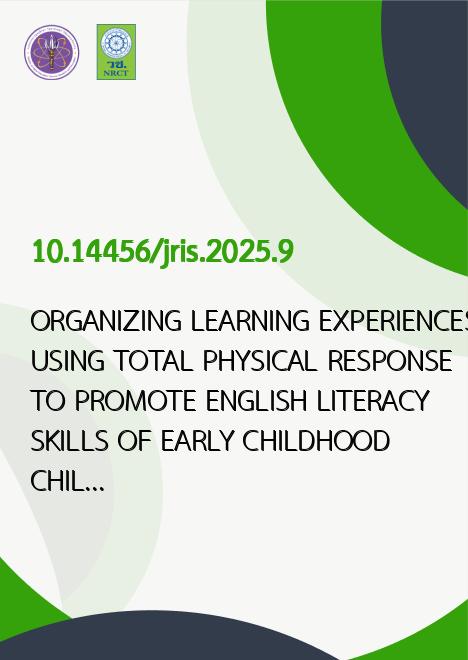
|
ORGANIZING LEARNING EXPERIENCES USING TOTAL PHYSICAL RESPONSE TO PROMOTE ENGLISH LITERACY SKILLS OF EARLY CHILDHOOD CHILDREN AT NAPA CHIANGMAI SCHOOL |
|---|---|
| รหัสดีโอไอ | |
| Creator | Ronnachit Apaivatin |
| Title | ORGANIZING LEARNING EXPERIENCES USING TOTAL PHYSICAL RESPONSE TO PROMOTE ENGLISH LITERACY SKILLS OF EARLY CHILDHOOD CHILDREN AT NAPA CHIANGMAI SCHOOL |
| Publisher | ห้างหุ้นส่วนจำกัด นวัตกรรมการเรียนรู้สร้างสรรค์ |
| Publication Year | 2568 |
| Journal Title | Journal of Research and Innovation for Sustainability (JRIS) |
| Journal Vol. | 2 |
| Journal No. | 2 |
| Page no. | 29-39 |
| Keyword | literacy skills, total physical response, early childhood |
| URL Website | https://so17.tci-thaijo.org/index.php/JRIS |
| Website title | Journal of Research and Innovation for Sustainability |
| ISSN | 3056-9397 |
| Abstract | This experimental research aimed to investigate the development of early childhood English literacy through organizing learning experiences using total physical response. This teaching approach enhances learning through physical movement and active participation, which effectively improves memory retention and language skill development. The research sample consisted of 23 kindergarten 2 students at Napa Chiangmai School during the 2024 academic year, selected by using simple random sampling, with class level serving as the unit of selection. The research tools included: 1) Three learning units: Unit 1 - Learning Vocabulary through Actions, Unit 2 - Reading Basic Words and Identifying Pictures, and Unit 3 - Learning Vocabulary through Songs and Group Activities; and 2) An English literacy assessment tool. Data analysis was performed utilizing mean and standard deviation. The findings indicated a continuous improvement in the development of English literacy skills among the children after participating in organizing learning experiences using total physical response. Furthermore, teachers should be encouraged to develop a diverse range of activities that are appropriate for children's developmental levels to ensure sustainable learning outcomes that align with the current educational context. |